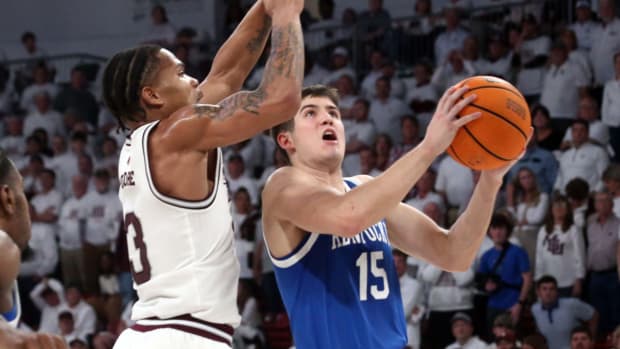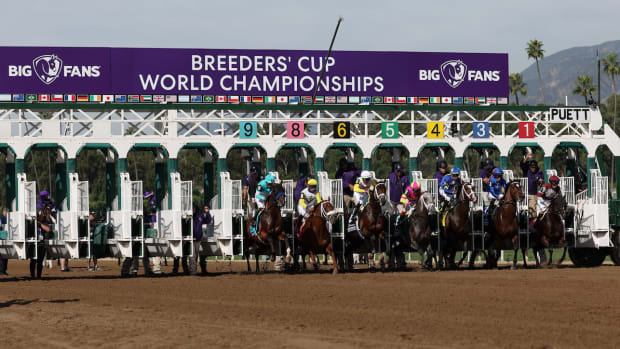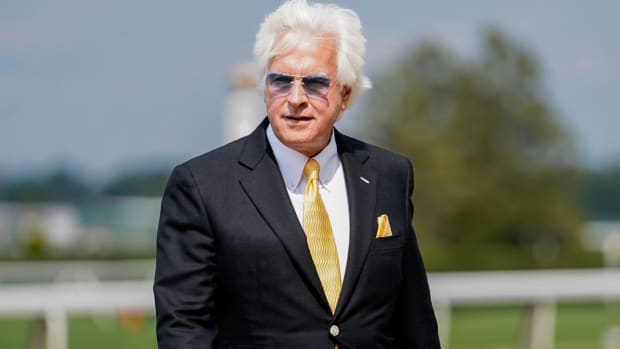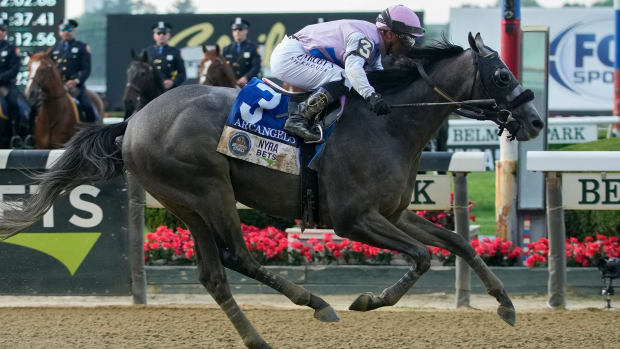Trainer Bob Baffert, Justify Jockey Mike Smith Relish a Remarkable Ride Before Belmont Stakes
ELMONT, New York – In the winter of 2002, thoroughbred horse trainer Bob Baffert was entrusted by big-spending owner Satish Sanan with the care and racing career of a very promising two-year-old colt named Vindication. Baffert was already a star in the sport (not as big as he is now, but a star nonetheless), having twice won the Kentucky Derby and Preakness, only to fall short of the Triple Crown in the Belmont. Sanan was in the midst of a decade-long spending spree of more than $150 million that would yield few big victories and he would eventually leave the game altogether. At the time, Vindication was important to both owner and trainer, both hunting for roses, and more.
Baffert, 48 at the time, went looking for a jockey and landed on 37-year-old Mike Smith, an established rider who was still rebuilding his career after a terrible spill at Saratoga in the summer of 1998, in which he suffered two fractured vertebrae in the middle of his back. A year earlier he had moved his tack from New York to California, as close to starting over as anything a jockey can do. He had ridden plenty of good horses before his injury, including 1994 Horse of the Year Holy Bull, but he was due for another great one. Or he was due to fade away. The mount on Vindication was big for Smith, too.
From late July to late October of 2002, Vindication would win all four of his races by a combined margin of 15 3/4 lengths, culminating in a 2 3/4-length victory in the Breeders' Cup Juvenile at Arlington Park, near Chicago. He was a breathtaking horse, and while great two-year-olds often do not become great three-year-olds, rarely do lousy ones become anything. "Wonderful horse," says Smith now, 16 years later. "He annihilated two-year-olds. Vindication was the first big horse Bob and I had together."
Justify Draws No. 1 Post for Belmont Stakes in Quest for Triple Crown
They have another one now, a massive chestnut colt named Justify, who has won this year’s Kentucky Derby and Preakness, and on Saturday at Belmont Park will try to become the 13th—and the second unbeaten, after Seattle Slew in 1977—Triple Crown winner. He would also be the second in four years, after American Pharoah won the Triple Crown in 2015, ending a notorious 37-year drought between triples. Smith did not ride Justify in his first race, on Feb. 18, but has ridden him in his four starts since. Smith praises Justify with pointed understatement. "He’s above average, man," he says, and to note, he drops man onto the back end of many sentences. It’s his verbal interview tic. And he makes it work.
The pairing of Baffert, now 65; and Smith, now 52, with Justify is the latest in a long and sometimes tumultuous—but not unusual, among trainers and jockeys—collaboration between two racetrack lifers, both raised in places where nearly as much Spanish is spoken as English. (Baffert in Nogales, Ariz.; Smith in Roswell, N.M. Both men are bilingual.) Vindication was, indeed, the first big horse between the two men, and could have been the last. After Vindication won the Breeders' Cup Juvenile and was made the Kentucky Derby winter favorite, Sanan and Baffert decided to replace Smith with Jerry Bailey, who is now retired and doing analysis for NBC, but at the time was the hottest jockey in the U.S. "I told Mike, 'I’m gonna have to take you off that horse,'" Baffert says. "And Mike said, 'You know, Bob, I understand. I know how it works.'"
This is how it works: The relationship between trainers and jockeys is full of sharp edges and nerve endings. Trainers court wealthy owners to provide them with talented horses and then rise every day before dawn to develop those horses into champions, or to put a finer point on it, profitable assets. And then in the afternoon, they turn their valuable animals over to small men in silks and watch helplessly as the jockeys either succeed or fail. Many trainers will complain privately that a jockey has cost him millions with a bad ride; some will do it publicly, too. There is always tension, in a relationship that can be mutually beneficial but also is mercenary at its core.
The jockeys, meanwhile, work while riding 1,200-pound animals at 30 miles an hour, multiple times every day, in a chaotic rodeo of horseflesh, where one bad step or one poor decision can kill people. They eat tiny meals, sometimes vomit them back up, and exercise daily to maintain a weight that is often unhealthy. They are constantly fighting for better healthcare, better insurance and better opportunities to market themselves. And many jockeys will complain privately that a trainer’s horse wasn’t as fast as the trainer thought. Very few will do it publicly.
And back in 1998, Smith, indeed, knew how it worked. The jockey is not just an athlete, but a businessman, too. Even the best ones can’t win on bad horses (at least not often). They need trainers to put them on fast horses. So even when you’re fired, like Smith was on Vindication, you bite hard on your tongue. "The whole business is a circle," says Smith. "Things come around. You always, always, always keep the lines of communication open, even if you get fired. Never burn a bridge, unless you don’t plan on walking back across that bridge ever again."
When Baffert took Smith off Vindication in the winter of 2003, this is how he ended the conversation: "Mike, I’m gonna make this up to you someday." (Footnote here: Vindication never ran another race. Two weeks after Baffert and Sanan hired Bailey, Vindication was injured and retired.)
Remembering Chic Anderson’s Legendary Call of Secretariat’s Record Run at 1973 Belmont Stakes
Baffert and Smith crossed paths occasionally over the next decade, never as a regular team, like Todd Pletcher and John Velazquez or, back in the day, Charlie Whittingham and Bill Shoemaker. In the spring of 2012, Baffert put Smith on a promising three-year-old named Bodemeister, after Baffert’s young son with his second wife, Jill. (Smith had not been floundering in the interim; he rode 2010 Horse of the Year and beloved mare Zenyatta, who did not lose until the 20th and final race of her career.) Like Justify, Bodemeister didn’t get to the races as a two-year-old, but was terrific in the pre-Derby spring, with dominant performances in the San Felipe Stakes in California and the Arkansas Derby.
Bodemeister went off as the 4-1 favorite in the Derby but got caught up in an early speed duel with no-shot sprinter Trinniberg. When Trinniberg tired, Bodemeister was left on the lead. He ran fast and bravely and was caught in the last 100 yards by I’ll Have Another. Baffert took the loss hard.
Just a few weeks earlier, he had suffered a heart attack and underwent surgery in Dubai. Two weeks after the Derby, Bodemeister got caught again at the line by I’ll Have Another and three weeks after that, Baffert put Smith on Paynter in the Belmont, and Smith let Union Rags through on the rail to win the race.
"Mike got the Triple Crown in second-place finishes," says Baffert now. "Union Rags coming up on the rail, that was bad. And I wasn’t happy about the Derby ride, either."
Smith says, "In the Belmont, I let a horse through on the inside. My fault. In the Derby, I don’t know. I’m not sure that was my fault. I’m not sure I would do anything differently. My horse was a little too quick that day. When [Trinniberg] fell back, I was out there all alone. But either way, Bob put me on the bench for a while after that."
Baffert says, "We took a little break."
Smith occasionally rode for Baffert, but their true reconciliation came in the summer of 2014, and as so happens in racing, it was nearly accidental. Baffert was preparing to send two horses to run in the Travers at Saratoga. One was American Freedom and the other was Arrogate. Neither had run in the Triple Crown races. Rafael Bejarano was the regular rider on both horses and was encouraged by American Freedom’s owners to ride their horse in the Travers. Jockeys, again, being businessmen, Bejarano relented. Baffert looked for a rider for Arrogate, who he felt was sitting on a massive performance. "Most of the top guys were gone," says Baffert. "Johnny [Velazquez] is gone. [Javier] Castellano is gone. Everybody. So I called Mike Smith. We met in my office at Santa Anita and Bejarano says to Mike, 'You can’t lose on this horse.’”
Arrogate won the Travers by 13 1/2 lengths and broke a 37-year-old track record. Smith came back to the winner's circle, saw Baffert and Bejarano and said, "Man, you guys were right." Smith stayed on Arrogate through three spectacular victories, in the Breeders' Cup Classic, Pegasus World Cup and Dubai World Cup. Arrogate tailed off at the end of his career, in the summer of 2017, but was a genuine comet, with Smith riding the tail. Baffert went back to Smith with Abel Tasman, winner of the 2017 Kentucky Oaks; and then with West Coast, a three-year-old colt who missed the ’17 Triple Crown but won the Travers and the Pennsylvania Derby.
2018 Belmont Stakes Odds: Favorites, Contenders, Betting Lines
On February 18 of this year, Baffert sent Justify to the post in a seven-furlong maiden race at Santa Anita. Jockey Drayden Van Dyke, 23, broke Justify slowly and got him into a fierce speed duel on the backstretch, 21 4/5 seconds for the first quarter and 44 1/5 for the half-mile. Baffert was furious. "I thought, sh--, he’s done," says Baffert. "Then at the quarter pole, he just explodes again. I mean, wow." In the winner's circle, Van Dyke, a respected young rider, said to Baffert, "Are you mad at me?"
Baffert: "Uh… a little bit."
Baffert says now, "I realized after that race that we’ve got a very serious horse on our hands. To make a second move like that, in his first race. Unbelievable. Horses don’t do that in their first race." Baffert called Smith, who rode Justify to an easy allowance win on March 11 and then another easy victory in the Santa Anita Derby. "Bob told me from the first day how talented this horse is," says Smith. "And man, he was right."
Smith, whose nickname is Big Money Mike, understands where he is on the career timeline. "On the back end, man," he says. He has long been relentless in the gym and while he has dialed back the heavy lifting, he still trains five days a week and often runs or bikes to those sessions. Now he has a chance to win the Triple Crown. It is a singular pressure that Smith battles pragmatically. "I’ve just got one race to win," he says. "If I think about all the other stuff, the history, that’s too much. Just one race."
Baffert says Smith does things with a great horse that younger jockeys don’t do. "Mike doesn’t care about anything but winning at this point in his life," says Baffert. "Watch him when he wins. He doesn’t stand up and celebrate, he just lets the horse pull up properly. The guys who stand up, lean one way or the other and raise their hands, that throws off a horse’s balance. Mike understands the whole deal. He’s a professional. He acts like he’s been there."
They have a chance to achieve something rare on Saturday, something that only 11 trainers and 11 jockeys have done (Trainer Jim Fitzsimmons and jockey Eddie Arcaro did it twice.) The fact that it was done three years ago doesn’t diminish the achievement; it is still wildly difficult and as rare as anything in sports.
And one other thing: The ledger is clean now. The books are balanced between trainer and jockey. Old scores are settled. As both men sat on the dais for the post-race press conference after the Kentucky Derby, Baffert leaned over to Smith: "Remember Vindication?"
Smith nodded.
Baffert said, "We’re even, motherf----r."




